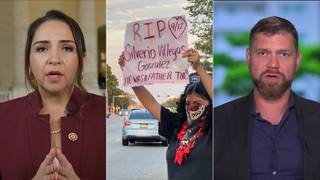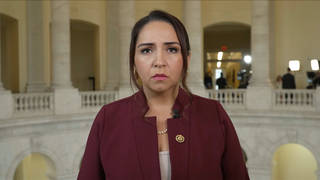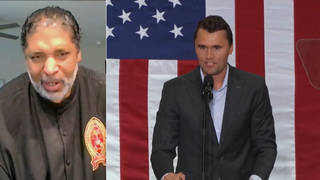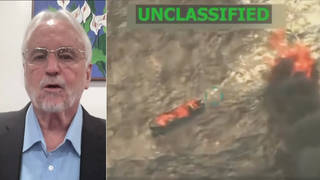Hi there,
Immigration raids are spreading across the country. The agencies meant to protect public health are being dismantled from within. Public broadcasting is being defunded... Today, Democracy Now!'s independent reporting is more important than ever. Because we never accept corporate or government funding, we rely on viewers, listeners and readers like you to sustain our work. Can you start a monthly donation? Monthly donors represent more than 20 percent of our annual revenue. Every dollar makes a difference. Thank you so much.
Democracy Now!
Amy Goodman
Hi there,
Immigration raids are spreading across the country. The agencies meant to protect public health are being dismantled from within. Public broadcasting is being defunded... Today, Democracy Now!'s independent reporting is more important than ever. Because we never accept corporate or government funding, we rely on viewers, listeners and readers like you to sustain our work. Can you start a monthly donation? Monthly donors represent more than 20 percent of our annual revenue. Every dollar makes a difference. Thank you so much.
Democracy Now!
Amy Goodman
Non-commercial news needs your support.
We rely on contributions from you, our viewers and listeners to do our work. If you visit us daily or weekly or even just once a month, now is a great time to make your monthly contribution.
Please do your part today.
HeadlinesDecember 10, 2009
Obama Receives Nobel Peace Prize
President Obama received the Nobel Peace Prize in Oslo today.
President Obama: “I receive this honor with deep gratitude and great humility. It is an award that speaks to our highest aspirations, that for all the cruelty and hardship of our world, we are not mere prisoners of fate. Our actions matter and can bend history in the direction of justice.”
Top General Predicts Rise in Afghan Violence
One day before the Nobel ceremony, the head of US forces in the Middle East said he expects violence to rise in Afghanistan as the US escalates the war. General David Petraeus made the prediction in testimony before the Senate Foreign Relations Committee.
Gen. David Petraeus: “As in Iraq, our troopers and their partners in Afghanistan will have to fight their way into enemy strongholds and clear enemy-controlled population centers. As in Iraq, the situation is likely to get harder before it gets easier. Violence likely will increase initially, particularly in the spring as the weather improves.”
Rep. Kucinich Unveils Measure for AfPak Withdrawal
As the US gears up to escalate the Afghan war, Congress member Dennis Kucinich says he plans to force a House vote on withdrawing all US forces from Afghanistan and Pakistan. On Wednesday, Kucinich announced he is seeking co-sponsors for a resolution calling for a “timely withdrawal” from the AfPak region. Kucinich expects to introduce the measure next month.
Obama Continues Bush-Era Rejection of Biological Weapons Inspections
The White House has announced it will continue a Bush administration policy of rejecting a global inspections system for biological weapons. On Wednesday, the Obama administration said the US remains opposed to inserting a new verification protocol in the Biological Weapons Convention. Under Secretary of State for Arms Control Ellen Tauscher made the announcement at a meeting of the convention’s signatories in Geneva.
Under Secretary of State for Arms Control Ellen Tauscher: “The Obama administration will not seek to revive negotiations on a verification protocol to the convention. We have carefully reviewed previous efforts to develop a verification protocol and have determined that a legally binding protocol would not achieve meaningful verification or greater security.”
The move affirms the stance of the Bush administration, which undermined a seven-year effort for an enforcement protocol at global talks in 2001. The Pentagon, as well as military, drug and biotech companies, have long opposed the enforcement proposal, claiming it could undermine US military and trade secrets.
US “Categorically Rejects” Climate Reparations
Here in Copenhagen, the US has rejected calls for the payment of climate reparations to poorer countries for the devastation wrought by global warming. Reparations advocates say the US and other industrialized nations owe a debt to poorer countries for the effects of decades of emissions. On Wednesday, the lead US negotiator, Todd Stern, said he “categorically rejects” the principle of climate debt.
Todd Stern: “We absolutely recognize our historic role in putting the emissions in the atmosphere up there that are — you know, that are there now. But the sense of guilt or culpability or reparations, I just — I categorically reject that.”
Island Nation Halts Copenhagen Session
Four days into the Copenhagen summit, protest actions continue inside the Bella Center as well as around the world. On Wednesday, hundreds of people staged a protest inside the summit in support of island countries. The rally came shortly after the island nation of Tuvalu interrupted a conference session to call for capping global temperature rises at 1.5 degrees Celsius instead of the proposed two degrees. Meanwhile, in Italy activists with the group Greenpeace scaled Rome’s historic Colosseum and unfurled a banner urging a binding global treaty to tackle global warming.
Protester: “Today Greenpeace is demonstrating to ask world leaders in Copenhagen to reach an historical agreement to save the climate, to save our future. Tomorrow, the President Barack Obama will be in Oslo to receive the Nobel Prize for Peace. Well, climate change and peace are two sides of the same coin.”
Danish Police Raid Activist Site
In other summit news, some 200 people were briefly detained Wednesday when Danish police raided a downtown building. Police say they seized items that were to be used for civil disobedience. No arrests were made. The Danish government provided the building as an accommodation center for out-of-town activists.
Zelaya Cancels Exit to Mexico
In Honduras, the ousted president Manuel Zelaya has canceled an exit to Mexico after the coup regime apparently refused to assure his safe passage. Zelaya was planning on leaving Honduras late Wednesday night. But sources close to the Honduran president say he was forced to delay the plan after the coup regime demanded he sign a document affirming the legality of his ouster. Aides say Zelaya does not want to leave Honduras to seek asylum, but to be in a better position to rally international support against the coup regime before his term expires next month. Zelaya has been holed up in the Brazilian embassy under military siege since returning to Honduras in September.
5 US Nationals Arrested in Pakistan
In Pakistan, five US citizens have been arrested on suspicion of ties to militant groups. The five were reported missing by their families in northern Virginia last week. One of the five reportedly left behind a video discussing Western attacks on Muslim nations. Muslim American leaders who viewed the video said it resembled a farewell message used before attacks carried out by militant jihadist groups. US law enforcement officials say they have no evidence the five have any links to militant groups or that they were planning an attack. On Wednesday, Ibrahim Hooper of the Council on American-Islamic Relations said Muslim American leaders will continue to assist the investigation.
Ibrahim Hooper: “It was the Muslim community that came forward, took the lead on this case, brought the information to law enforcement authorities, and is continuing cooperation with law enforcement authorities as this investigation goes forward.”
Kuwait Prisoner Released from Gitmo
A Kuwaiti national has been freed from an eight-year imprisonment at Guantanamo Bay after a judge ruled US interrogators coerced him into making a wrongful confession. The prisoner, Fouad al Rabia, was seized in Afghanistan in 2001. Defense attorneys say Rabia was repeatedly tortured at Guantanamo until he falsely confessed to being an aide to Osama bin Laden. In her ruling, Judge Colleen Kollar-Kotelly said the military ignored evidence backing Rabia’s claim that he had gone to Afghanistan on an annual humanitarian mission. Rabia first challenged his imprisonment in 2002. It took seven years for his case to be heard.
Activists Launch Bolivarian Continental Movement
In Venezuela, hundreds of activists gathering from twenty-six countries have formed a new regional movement to oppose US militarism in Latin America. The Bolivarian Continental Movement is named after the South American independence leader Simon Bolivar. On Wednesday, the Colombian government condemned the group for reading a statement from Alfonso Cano, commander of the Revolutionary Armed Forces of Colombia, during its opening session.
Dems’ Rejection of Public Option Boosts Insurers’ Stocks
Back in the United States, stock prices in the nation’s largest insurance companies are on the rise following news of a Senate plan to abandon the public insurance option. The Standard & Poor’s Managed Health Care index rose 1.6 percent Wednesday, compared to a 0.6 percent drop for the broader index of 500 companies. The gains followed Senate Majority Leader Harry Reid’s announcement that Democrats won’t propose a government-funded health plan to compete with private insurers. Instead, Democrats will back a measure in which the federal Office of Personnel Management would hire the insurance companies to run government-backed health plans. One day after Reid’s announcement, a new poll showed a majority of Americans continue to support the public option rejected by Democrats. Fifty-nine percent want a government-funded public option included in a healthcare reform bill, a 30-point margin over the percentage of Americans opposed.
Mayors: 26% Rise in Food Aid Needs
The demand for food aid in the United States has seen its largest increase in nearly two decades. In a report this week, the US Conference of Mayors says cities reported an average 26 percent rise in hunger assistance requests, the highest since 1991.
US Prison Population Hits All-Time High
New figures meanwhile show the US prison population has reached an all-time high. According to the Justice Department, 2.3 million people were behind bars last year. The prison population continues to grow at less than one percent, down from an annual six percent growth during the previous decade.
Wall St. Bailout Extended to 2010
The Obama administration says it will extend the Wall Street bailout program for close to a year. On Wednesday, Treasury Secretary Timothy Geithner said the Troubled Asset Relief Program will continue until October 2010.
SF State Students Occupy Building
In California, a group of students at San Francisco State University have occupied a campus building in support of accessible, affordable education. The protest is the latest in a series of actions against fee hikes and budget cuts at California universities.
Sentences Reduced for Two of Cuban Five
And two former Cuban intelligence officers convicted of spying in the US have been given reduced sentences. The pair’s sentences were vacated earlier this year after an appeals court ruled they were too severe. Ramon Labanino’s life term was reduced to thirty years, while Fernando Gonzalez has had one year taken off his initial nineteen-year bid. The two are part of the group known as the Cuban Five, who were convicted in 2001 for spying in southern Florida. The men say they weren’t spying on the US but trying to monitor violent right-wing Cuban exile groups responsible for attacks inside Cuba. The Cuban Five trial was the only judicial proceeding in US history condemned by the UN Human Rights Commission.
Most popular
- 1
- 2
- 3
- 4
Non-commercial news needs your support
Please do your part today.










Media Options